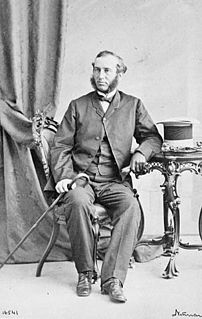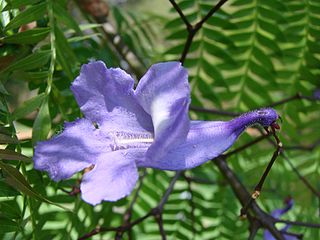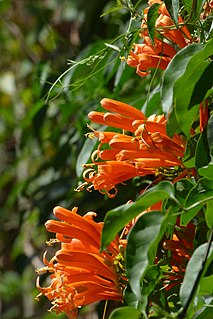
Sir Alexander Campbell was an English-born, Upper Canadian statesman and a father of Canadian Confederation.

Jacaranda is a genus of 49 species of flowering plants in the family Bignoniaceae, native to tropical and subtropical regions of the Americas.

The Rapateaceae are a family of flowering plants. The botanical name has been recognized by most taxonomists.

Schoepfia is a genus of flowering plants belonging to the family Schoepfiaceae. The genus has long been placed in the Olacaceae family though many researchers noted the differences between it and the rest of the family. Recent molecular studies have shown Schoepfia to be more closely related to the families Misodendraceae and Loranthaceae, and to uphold the criteria of monophyly it must be excluded from Olacaceae.

Swartzia is a genus of legume in the family Fabaceae. It was named in honor of Swedish botanist Olof Swartz and contains about 200 species. Swartzia is restricted in its geographical distribution to the New World Tropics, where it occurs primarily in lowland rainforests, but also in savannas, pre-montane forests, and tropical dry forests. While it can be found throughout the wet lowlands from Mexico and the Caribbean islands to southern Brazil and Bolivia, Swartzia is most abundant and species-rich in Amazonia, where 10–20 species may co-occur at a single site. The species of Swartzia are mostly trees, ranging from small understory treelets to large canopy emergents. Some species, especially in savannas, are mult-stemmed shrubs.

Dicymbe is a genus of 20 species of canopy trees in the family Fabaceae, within subfamily Detarioideae. It is found throughout the Guyana Shield region and parts of W Amazonia. Certain species within the genus are strongly associated with ectomycorrhizal fungi.
Heterostemon is a genus of flowering plants in the family Fabaceae. It belongs to the subfamily Detarioideae. It is usually green and often has white dots along its leaves.

Anemopaegma is a genus of flowering plants in the family Bignoniaceae. Species of Anemopaegma along with many other unrelated plants go by the name of catuaba.
Appunia is a genus of flowering plants in the family Rubiaceae. It was described by Joseph Dalton Hooker in 1873. The genus is found from southern Mexico, Central America, and northern South America.

Winifred Lily Boys-Smith was an English science artist and lecturer, university professor, school principal. She was born in Corsham, Wiltshire, England on 7 November 1865.
Humphry Sandwith (1792–1874), or Humphrey Sandwith III, was an English physician and prominent Methodist.

Amphilophium is a genus of flowering plants in the family Bignoniaceae, native to South America. Amphilophium crucigerum has escaped from cultivation elsewhere.
John Sandwith Boys Smith was a 20th-century British priest and academic.

Henry Sturgis Drinker was an American mechanical engineer, lawyer, author, and the fifth president of Lehigh University.

Pyrostegia is a genus of plants in the family Bignoniaceae, native to tropical and subtropical areas of the Americas.
Casselia is a small genus of flowering plants in the verbena family (Verbenaceae) first named in 1823. Plants in the genus Casselia are native to South America.

Dolichandra is a genus of flowering plants in the family Bignoniaceae, native to Latin America and the Caribbean. They are climbing lianas with trifid and uncate tendrils.
Whittonia is a genus of flowering plants belonging to the family Peridiscaceae.
Catostemma is a genus of flowering plants belonging to the family Malvaceae.
Coutoubea is a genus of flowering plants belonging to the family Gentianaceae.











